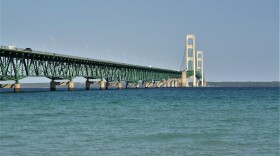Environmental groups gathered over the weekend to mark the 15th anniversary of an oil spill into the Kalamazoo River. The message they delivered is this: That oil spill 15 years ago was a warning about what could happen if an oil pipeline that runs through the Great Lakes is not shut down.

Tented booths were set up to represent different groups that responded to what happened 15 years ago when Enbridge’s Line 6b burst. One-point-two million gallons of oil was recovered from that tar sands oil spill along more than 35 miles of the Kalamazoo River and one of its tributaries near Marshall, Michigan.
A report from the Federal On-Scene Coordinator extensively details the event and the damage, but residents say there was also a toll on them that is incalculable.
The Michigan Climate Action Network organized the event at the Historic Bridge Park near Battle Creek. That site was chosen because it was part of the long stretch of contaminated shoreline.
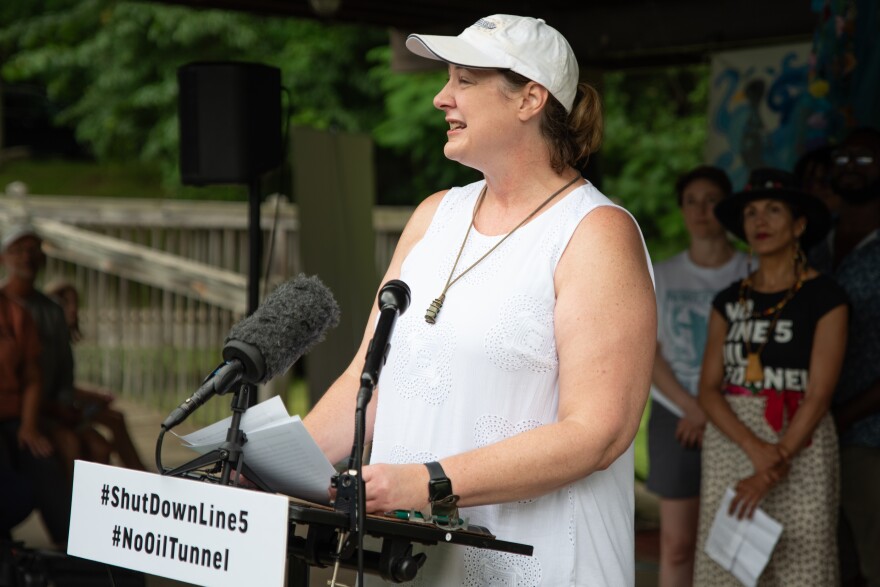
Denise Keele is the Executive Director of that group. She says no one has forgotten the damage caused by Line 6b. That’s why they worry about Line 5.
“The message remains the same: to shut down Line 5 and no oil tunnel. We are here today on the 15th anniversary of the Kalamazoo River oil spill so that history does not repeat itself. We should learn from our mistakes.”
Keele added the other mistake is perpetuating the use of fossil fuels that’s causing disruption of the Earth’s climate.
Local residents say they've paid a price because of the oil spill 15 years ago.
"The massive Enbridge oil spill into our Kalamazoo River was so toxic that when we went that day to see it firsthand, we quickly left, feeling ill from the smell. We knew it must never happen again," said Iris Potter with the group Kalamazoo Remembers.
She said Michigan should learn from that experience as the state reviews permit applications from Enbridge for a proposed tunnel under the Straits of Mackinac to house a new segment of the 72-year-old the Line 5 pipeline.
“So now, just envision that in the Straits and beyond. A spill happens when you least expect it and quickly the beauty is gone. Believe me,” Potter said to the crowd and an online audience watching the speeches.
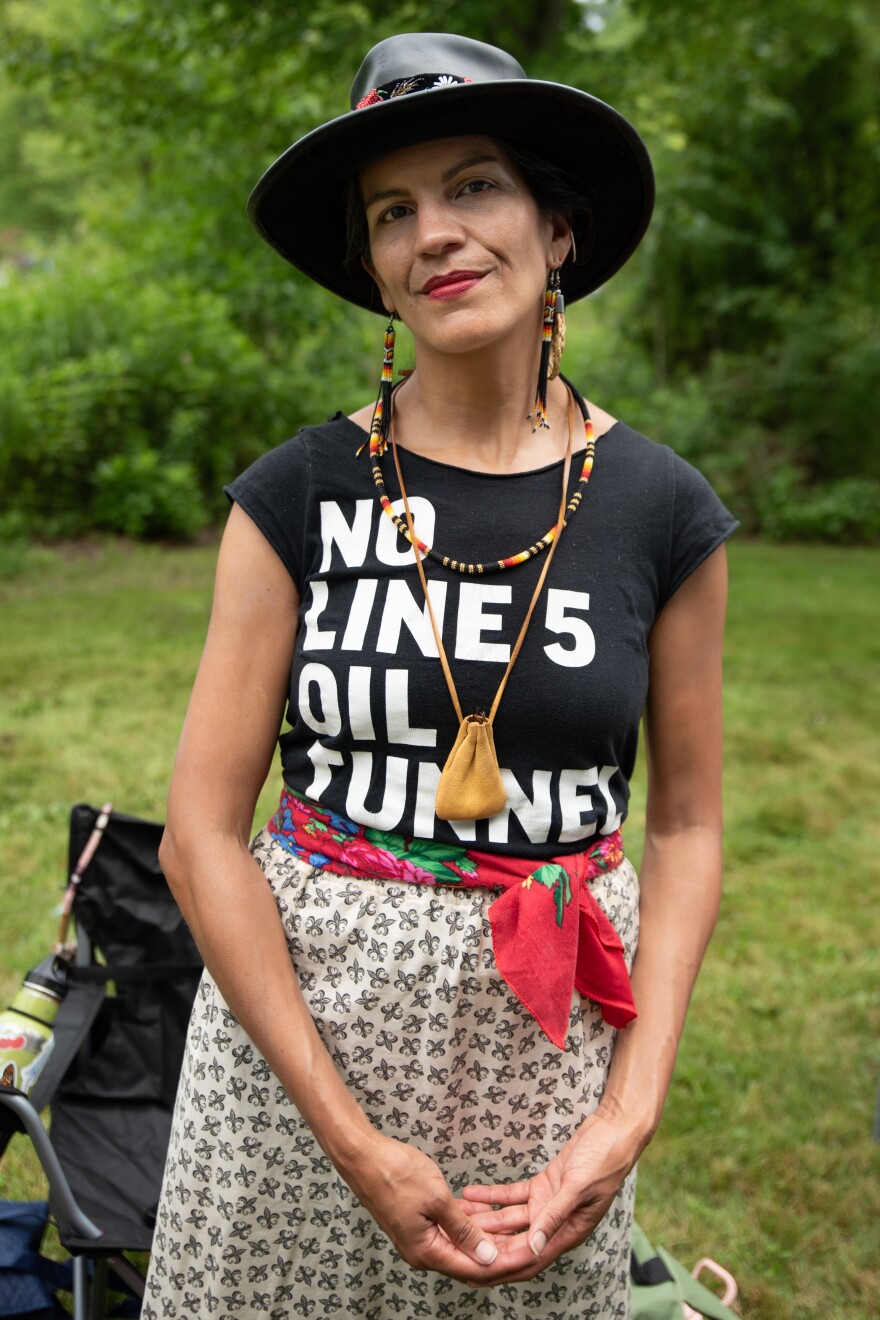
Nichole Keway Biber is the Mid-Michigan Organizer of Michigan Clean Water Action. She’s also a citizen of the Little Traverse Bay Bands of Odawa Indians. She noted that today Line 5 is more than 30 years older than Line 6b was when it ruptured.
“The many places that 645-mile-long pipeline crosses over waters is close by to the Great Lakes, beyond just the absurdity of that four-mile-stretch beneath the Straits. That’s all a threat. That pipeline is over 70-years-old,” Biber said.
Some of the environmental groups’ leaders spoke to those gathered at the event. Sean McBrearty is Coordinator of the Oil and Water Don’t Mix campaign. He talked about the Kalamazoo River oil spill and its legacy.
“This was entirely man-made. And it was only as big as it became because the negligence of the people who know, the U.S. Army Corps of Engineers, and the federal government are asking us to trust the Great Lakes with.”
He said that devastating Line 6b oil spill -one of the largest inland oil spills in the U.S.- spurred a movement.
“A movement that says never again are we going to let major corporations like Enbridge spill oil into our rivers. A movement that says we’re going to protect our Great Lakes. And make sure the same company responsible for this oil spill does not strike again, this time with a larger pipeline running more oil in the heart of the Great Lakes.”
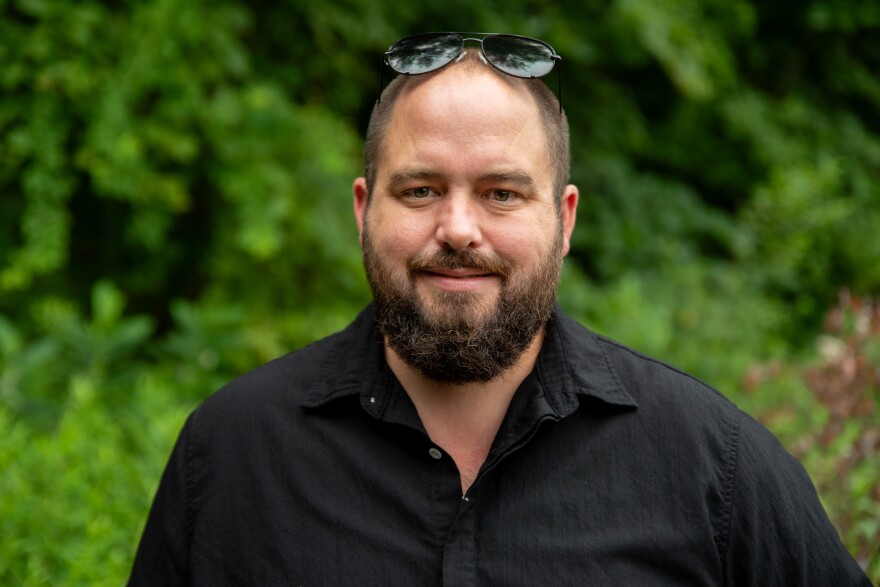
Right now, the Michigan Department of Environment, Great Lakes, and Energy (EGLE) is taking comments from the public on permit applications submitted by Enbridge. The company wants to tunnel under the Straits of Mackinac to house a new segment of Line 5. The current pipeline sits on the lakebed of the Straits that connect Lake Michigan and Lake Huron.
Beth Wallace is the Great Lakes climate and energy director for the National Wildlife Federation. She said EGLE is falling short in its responsibilities. It should be reviewing what kind of environmental damage could be caused by tunneling under the Straits of Mackinac in addition to the impacts where the tunnel construction begins and ends above ground.
"Our own state agencies, the ones that were stuck here sucking oil out of the river, seem to be playing right into the hands (of Enbridge), refusing to properly assess risk for a pipeline that poses a disaster for 20 percent of the world's (accessible) fresh water," Wallace told the crowd.
She questioned whether the Department of Environment, Great Lakes, and Energy was fulfilling its obligations under the Great Lakes Submerged Lands Act to review whether the drilling of the tunnel itself would have environmental impacts.
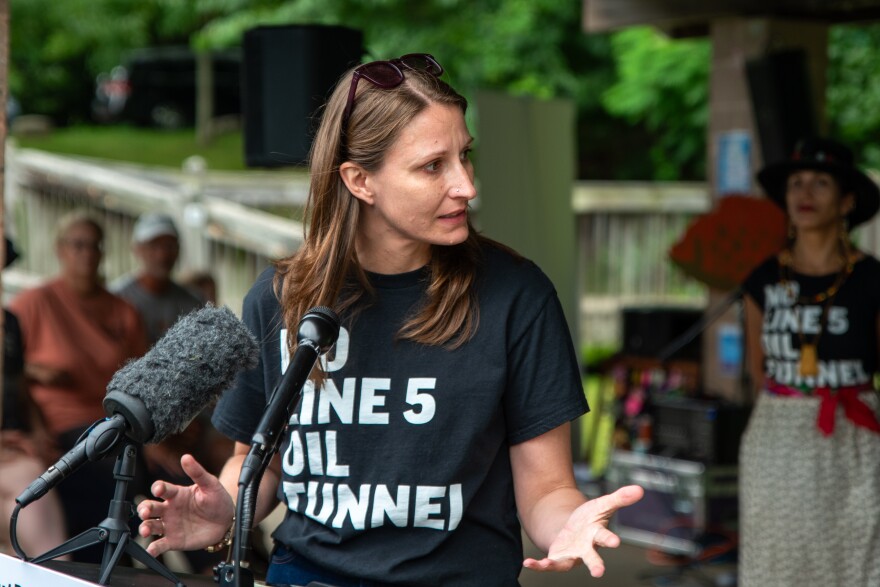
“Who are the decisions really serving? They’re not the people of Michigan. They’re not the tribes who have stewarded these waters for generations, and not the millions that rely on the Great Lakes.”
In a previous Michigan Public news story, EGLE said that during its review of the Enbridge Line 5 tunnel proposal, the top priority has been protecting the Straits of Mackinac and surrounding wetlands from adverse environmental impacts. The tunnel would hold a pipeline that carries petroleum products through an environmentally sensitive area, replacing the line that runs along the bottom of the straits.
EGLE added that The Great Lakes Submerged Lands Act is used primarily for construction projects on the bottomlands of the lake.
When asked what the groups were willing to do to stop Line 5 and the proposed tunnel, Wallace said if EGLE does not do its job fully, the National Wildlife Federation will take the agency to court.
Nichole Keway Biber with the Michigan Clean Water Action and member of the Little Traverse Band of Odawa responded to the question this way.

“Our indigenous people and our nations and our allies aren’t going to let this happen. We cannot. We cannot. So, if they want us to be up there camping out, and bring our drums, and bring our medicine, we’re ready to do that," she said to cheers and applause of several of those gathered.
When asked for a comment regarding the concerns of the environmental groups, Enbridge responded:
"Enbridge’s commitment to safeguarding the Great Lakes, natural resources, and communities continues to drive our work behind building the Great Lakes Tunnel, and locating a new, replacement section of the Line 5 pipeline inside the protection of the tunnel, deep under the lakebed.
We support and welcome the public comment process now underway. Public and stakeholder input is essential to the process and we look forward to hearing feedback and answering questions."
EGLE is taking comments about the construction of the proposed tunnel and any concerns about environmental damage caused by it are being taken online or through the mail until August 29. You can learn more about the permits and leave comments here. Or you can submit comments by mail to:
EGLE, GDO-WRD
P.O. Box 30458
Lansing, Michigan 48909-7958
or by email to egleenbridge-public-comments@michigan.gov
Before that deadline, EGLE will hold a virtual and informal question and answer session on August 12 at 6:00 p.m. In a notice, EGLE said questions should be related to the proposed project and the permit application review.
A formal public hearing will also be online. It will be held on August 19 at 6:00 p.m. You can register for that meeting here.
Enbridge is among Michigan Public's corporate supporters.
Here's some background from our partners at Detroit PBS.






